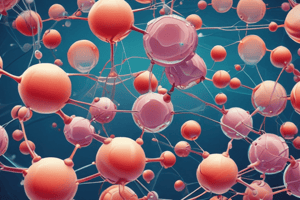Podcast
Questions and Answers
What happens to mixtures when heated enough?
What happens to mixtures when heated enough?
- They combine permanently
- They become elements
- They turn into compounds
- They separate again (correct)
Why is stoichiometry crucial in chemistry?
Why is stoichiometry crucial in chemistry?
- To balance all materials involved in a reaction (correct)
- To identify the melting points of compounds
- To determine the color of substances
- To predict the atomic number of elements
What do balanced chemical equations help predict?
What do balanced chemical equations help predict?
- The amount of products formed (correct)
- The boiling point of substances
- The electrical conductivity of elements
- The viscosity of solutions
How do elements behave when mixed with another substance?
How do elements behave when mixed with another substance?
Why can understanding basic chemistry principles help in everyday life?
Why can understanding basic chemistry principles help in everyday life?
What type of bonding occurs when electrons are transferred from metals to nonmetals?
What type of bonding occurs when electrons are transferred from metals to nonmetals?
In which type of bonding do atoms share electron pairs?
In which type of bonding do atoms share electron pairs?
What is the result of combining positively charged sodium metal with negatively charged chlorine gas?
What is the result of combining positively charged sodium metal with negatively charged chlorine gas?
What distinguishes a compound like water from individual hydrogen and oxygen atoms?
What distinguishes a compound like water from individual hydrogen and oxygen atoms?
Which type of bond involves sharing electrons within particles called metal ions?
Which type of bond involves sharing electrons within particles called metal ions?
What makes elements behave differently from other substances according to the text?
What makes elements behave differently from other substances according to the text?
Study Notes
Chemistry is one of the most exciting sciences because it deals directly with matter—what things are made of and how they change. In tenth grade chemistry, students learn some fundamental concepts that make up this field. Here's what you can expect to study:
Atoms, Molecules, and Compounds
Atoms come together in various combinations to form molecules and compounds. For example, hydrogen atoms combine in pairs to form a diatomic molecule known as Hydrogen Gas which has properties different from individual hydrogen atoms. A compound like water consists of two hydrogen atoms attached to each oxygen atom. This combination makes all the difference when studying their behavior under various conditions.
Bonding
Bonds between atoms control chemical reactions and the behaviors of substances. There are three main types of bonds: ionic bonding, covalent bonding, and metallic bonding. Ionic bonding occurs when electrons are transferred from metals to nonmetals creating opposite charges, like positively charged sodium metal and negatively charged chlorine gas, resulting in table salt. Covalent bonding involves sharing electron pairs, such as hydrogen and fluorine. Metallic bonding also involves sharing electrons within particles called metal ions.
Elements vs. mixtures
There are four occurrences that lead elements to behave differently from other things. They react, settle out, burn away, or are changed into something else. An element will always do one of these things when mixed with another substance. On the other hand, mixtures consist of more than one type of particle held together by physical forces, and if you heat them enough, they separate again.
Stoichiometry
This concept is crucial in chemistry since it helps us determine how much material we need to start a reaction. It comes down to balancing all the materials involved using simple arithmetic operations. Balanced equations tell us exactly what to mix and help predict what new products might result from combining certain amounts of reagents.
Chemistry allows scientists to explain why materials change states, have specific properties, and interact with each other. By understanding these basic principles, you'll appreciate not only everyday life but also understand the world around you better!
Studying That Suits You
Use AI to generate personalized quizzes and flashcards to suit your learning preferences.
Description
Learn the fundamental concepts of tenth grade chemistry, including atoms, molecules, compounds, bonding, elements vs. mixtures, and stoichiometry. Explore how atoms combine to form different substances, understand the types of chemical bonds, differentiate between elements and mixtures, and grasp the importance of stoichiometry in chemical reactions.




